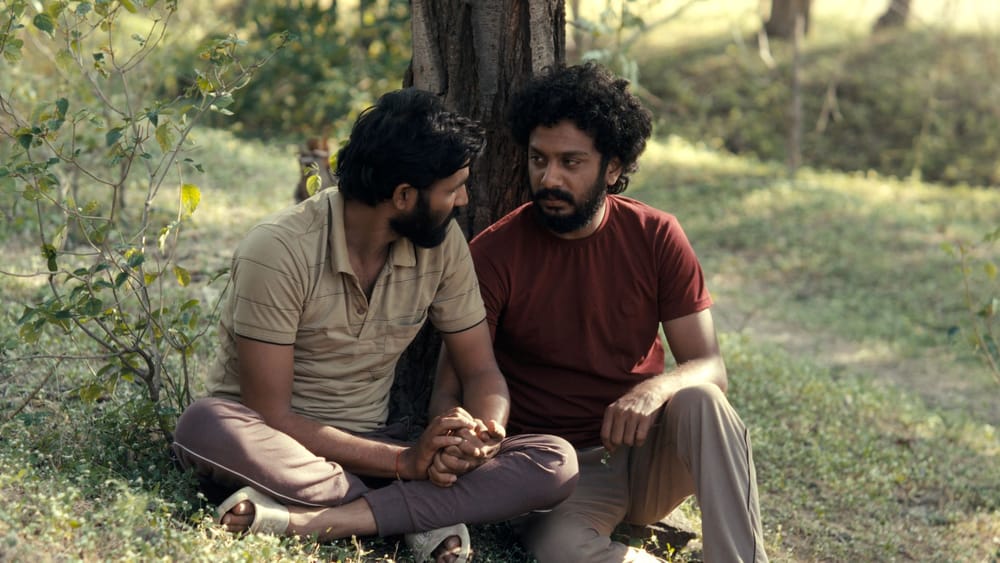In the remote villages of India, where time seems to hold on to traditions as tightly as the dry earth clings to its roots, the gentle tides of change are finally making their presence felt. This is the world Rohan Kanawade explores in his semi-autobiographical debut film, a tender and deeply thoughtful portrait of loss, love, and the quiet struggles beneath the surface of everyday life.
The film follows Anand, portrayed with remarkable subtlety by Bhushaan Manoj, who returns home from his bustling job in a Mumbai call centre to care for his mother, Suman, played with heartfelt warmth by Jaysri Jagtap. Anand’s father has recently passed, and amidst the weight of grief, Anand is called upon to perform the traditional ten-day funeral rites—a responsibility that is as much about honoring the past as it is about confronting the present. The village, unchanged in many ways yet subtly shifting in others, presses on with its customs even as the land itself bears the marks of harder summers and a changing world.
Anand’s return is layered with complexities that Kanawade unpacks with exquisite care. His mother knows why he never married, a fact quietly accepted yet never openly spoken about among the villagers. Anand’s sexual orientation, revealed to his father before his passing, is a source of personal struggle and guilt. Despite his parents’ acceptance, the shadows of societal pressure weigh heavily on him. He navigates the tender, sometimes fraught space between being true to himself and protecting his mother from the harsh judgments of the community.
Against this backdrop, the film introduces Balya, Anand’s childhood friend, brought to life with gentle authenticity by Suraaj Suman. Balya’s life remains deeply entwined with the land as he herds goats under the relentless expectation of marriage—a pressure that grows heavier as the days pass. Anand and Balya’s connection unfolds naturally, evolving from shared escapes and mutual understanding into a quiet romance that is never rushed or defined by grand declarations. Their relationship is tender and nuanced, blurring the lines between friendship and love in ways that feel both intimate and universal.
What sets this film apart is its refusal to rely on spectacle or melodrama. Kanawade embraces stillness and silence as powerful narrative tools. Every unspoken glance, every lingering touch, holds a weight that words often cannot convey. The natural rhythms of rural life—the still waters of a polluted lake, the concrete covering the once-beautiful temple walls, the arid fields stretching under the hot sun—become metaphors for change, loss, and resilience.
Anand’s participation in the funeral rites gradually shifts from a sense of duty to something more profound. While he may not fully believe in all the villagers’ traditions, he develops a reverence for the rituals themselves—as links to a past that shaped him, and as a way to process his own grief. His journey is both outward, through the landscape and community, and deeply inward, towards acceptance and healing.
The performances are quietly magnificent. Jaysri Jagtap’s Suman is the emotional anchor, a mother whose fierce love shields and supports her son even as she grapples with her own hopes and fears. Bhushaan Manoj captures Anand’s fragility and strength with a nuanced balance, portraying a man who must return not only to a place but to himself. Suraaj Suman’s Balya brings warmth and a gentle earnestness that perfectly complements Anand’s complexity.
Kanawade’s direction is marked by a profound sensitivity and authenticity. Having grown up in the city himself, his depiction of rural life feels both intimate and respectful—an ode to a way of life that is quietly fading yet remains vital in its influence. This is a film that honors its characters without judgment, portraying the intersection of modernity and tradition with compassion and nuance.
By the film’s end, as Anand boards the train back to the crowded, chaotic city, there is a sense that the open skies and slow rhythms of the village have left an indelible mark on his heart. This is a story about the many forms of love—the love between a mother and son, the budding romance between two men discovering each other’s worlds, and the love that connects us to our histories, even as they evolve.
This film is an intimate, lyrical meditation on longing—longing for family acceptance, for belonging, for connection, and for peace. It speaks tenderly to the experience of returning home as a queer person, capturing the awkwardness, the grief, and above all, the enduring love that threads through it all. Rohan Kanawade’s debut is a rare and beautiful gift—a quiet film that resonates loudly in its honesty and heart.
Director: Rohan Parashuram Kanawade
Cast: Bhushaan ManojSuraaj SumanJayshri Jagtap
Writer: Rohan Parashuram Kanawade
Producers: Neeraj ChuriMohamed KhakiKaushik RayNaren ChandavarkarSidharth MeerHareesh ReddypalliRohan Parashuram Kanawade

